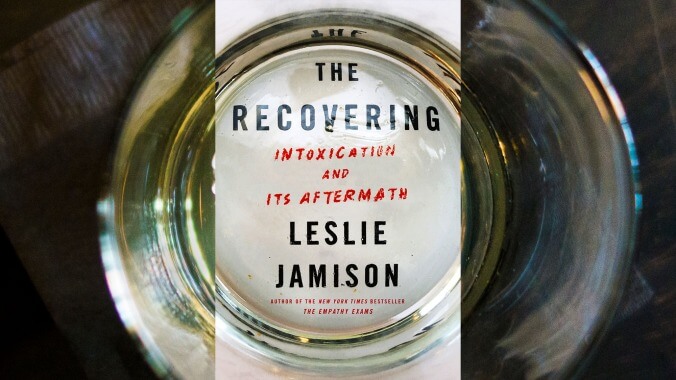Incisive and expansive, Leslie Jamison’s The Recovering is an addiction memoir for the ages

Hemingway in Cuba. John Cheever’s drunk swimmer. Carson McCullers’ gin and cigarettes diet. Writing and drinking have long intertwined in the cultural consciousness, often making legendary myths of artists with very real drinking problems. In her new critical memoir, The Recovering: Intoxication And Its Aftermath, Leslie Jamison examines the intersection of art and alcohol, and the stories we tell about addiction. Weaving in historical research and original reporting, she also traces her own alcoholism and subsequent recovery at the age of 27.
Like many suffering from substance abuse, Jamison was high-functioning throughout her addiction, and extraordinarily so: She graduated from Harvard; held down multiple jobs; and twice attended graduate school—first, the venerable Iowa Writers’ Workshop and then Yale. While avoiding the sensationalist, over-the-top details of lesser addiction memoirs like James Frey’s A Million Little Pieces, Jamison nonetheless makes palpable how strong her desire for alcohol was, with each day becoming a countdown to how quickly she could get drunk that evening. Although she cites a family history, a father who was often away, and a desire to escape “the endless chatter of [her] inner monologues and self-appraisals,” she refrains from getting mired in the armchair psychology of her motivations for drinking, understanding that such explanations are nearly always insufficient. “My childhood was easier than most,” she writes, “and I ended up drinking anyway.”
Jamison has proven herself to be both a fierce intellectual and an extreme empath. In her 2014 New York Times bestselling essay collection, The Empathy Exams, she often worked herself into near logical contradictions, resulting from a kind of head vs. heart dichotomy. In her essay on the controversial Morgellons disease, which involves thinking one’s skin is infected by insects or objects like thread, Jamison got as close as she could to believing the disease’s sufferers without directly affirming it. She performs similar moves in The Recovering while writing on her time in Alcoholics Anonymous, specifically regarding the power of language and storytelling. As a writer dedicated to specificity and uniqueness—the old modernist maxim to “make it new”—she at first resists the “one day at a time” clichés of AA. Yet she also understands how such timeworn language helps people, herself included:
In recovery, I found a community that [suggested] instead that a story was most useful when it wasn’t unique at all, when it understood itself as something that had been lived before and would be lived again. Our stories were valuable because of this redundancy, not despite it. Originality wasn’t the ideal, and beauty wasn’t the point.
 Keep scrolling for more great stories.
Keep scrolling for more great stories.
